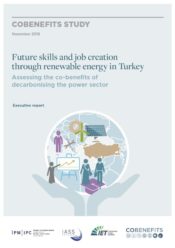 This study examines how increased deployment of renewable energy in Turkey can provide co-benefits for job creation and meeting future skills requirements. The study methodology focused firstly on defining value chains for the solar and wind energy sectors in Turkey. This was done using licence and pre-licence information from the Energy Market Regulatory Authority and a unique administrative micro dataset (EIS) that includes all registered firms in Turkey and their employees registered with the Social Security Institution (SGK). Secondly, coefficients for the current ratio of employment per megawatt (MW) in the solar and wind sectors were calculated. Finally, projections of employment increases and skills requirements were estimated according to four scenarios for increased renewable energy (RE) capacity. The results show that increased employment is possible through renewables.
This study examines how increased deployment of renewable energy in Turkey can provide co-benefits for job creation and meeting future skills requirements. The study methodology focused firstly on defining value chains for the solar and wind energy sectors in Turkey. This was done using licence and pre-licence information from the Energy Market Regulatory Authority and a unique administrative micro dataset (EIS) that includes all registered firms in Turkey and their employees registered with the Social Security Institution (SGK). Secondly, coefficients for the current ratio of employment per megawatt (MW) in the solar and wind sectors were calculated. Finally, projections of employment increases and skills requirements were estimated according to four scenarios for increased renewable energy (RE) capacity. The results show that increased employment is possible through renewables.
Download:
Key Policy opportunities:
Policy opportunity 1: Turkey can significantly boost gross employment by increasing the share of renewables. With the decision by the Turkish Government to increase solar energy capacity by 60 % and more than double wind electricity capacity over the next 10 years, the government paved the way to create more than 7,400 jobs along the solar value chain and more than 59,000 jobs along the wind value chain in the next ten years alone.
Policy opportunity 2: There is room for more: By following more ambitious renewable pathways for Turkey, the expected increases in value of production can be more than doubled across the wind power value chain and increased eightfold along the solar value chain, pushing up the total value of production by more than 69 billion USD in the next ten years compared to 2016.
Policy opportunity 3: While the expected growth of Turkey’s wind and solar power producers will increase the demand for high-skilled jobs, middle-skilled workers are the main beneficiaries of job creation across the whole wind and solar value chains, with 55 % of job additions in this labour segment.
Year of publication: 2019
Editors: Mara Gomez, Pinar Ertor, Sebastian Helgenberger, Laura Nagel – IASS Potsdam and Istanbul Policy Center (IPC), Sabanci University
Technical implementation: Bengisu Özenç, Efşan Nas Özen – Cobenefits researchers at Istanbul Policy Center (IPC), Sabanci University
Suggested citation: IASS/IPC. Future skills and job creation through renewable energy in Turkey. Assessing the co-benefits of decarbonising the power sector. Potsdam/Istanbul: IASS/IPC, 2019.
DOI: 10.2312/iass.2019.033
This study is part of a series of four studies assessing the co-benefits of decarbonising the power sector in Turkey, edited by IASS, IPC, EPRA and IET.
- Industrial development, trade opportunities and innovation with renewable energy in Turkey
- Improving people’s health and unburdening the health system through renewable energy in Turkey
- Securing Turkey’s energy supply security and balancing the current account deficit through renewable energy
